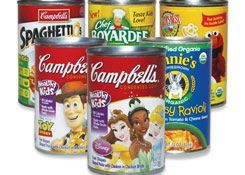Are We Safe? Bisphenol A in Kids Food

Bisphenol A, an industrial chemical, has been found in canned food for children, according to an investigative report by the non-profit Breast Cancer Fund.
Known to be a weak estrogen (hormone) in humans and animals, Bisphenol A has been in the spotlight for a wide range of reasons, including, but not limited to, cancer, attention deficit hyperactivity (ADHD), diabetes and obesity. Today's study links the harm to breast cancer found after testing in rats.
The substance has been tested in humans and been found to be generally safe. When infant rats were exposed to levels of 250 parts per billion, the rodents later developed breast cancer as adults.
The Breast Cancer Fund report shows levels of Bisphenol A in several brands of canned food.
The highest levels were found in Campbell's Disney Princess Cool Shapes at 148 ppb and 90 ppb in Campbell's Toy Story Fun Shapes at 90 ppb.
The lowest levels were 16 ppb in Campbell's Spaghettios with Meatballs.
|
Company |
Item |
BPA Level (in parts per billion) |
|
Campbell’s |
Disney Princess Cool shapes, Shaped Pasta with Chicken in Chicken Broth |
148 |
|
Campbell’s |
Toy Story Fun Shapes, Shaped Pasta with Chicken in Chicken Broth |
90 |
|
Earth’s Best |
Organic Elmo Noodlemania Soup, USDA Organic |
42 |
|
Annie’s Homegrown |
Cheesy Ravioli USDA Organic |
34 |
|
Chef Boyardee |
Whole Grain Pasta |
21 |
|
Campbell’s |
Spaghettios with Meatballs |
16 |
What are safe guidelines?
Under current guidelines, the U.S. Environmental Protection Agency sets safe levels at around 50 ppb (parts per billion) based on calculations that less than 5 ppb are in foods. Food would have to be eaten in around 600 kilogram doses for it to be dangerous. The intake of food levels in kids is currently much less.
A study of 3,400 Chinese adults published Tuesday in the Annals of Internal Medicine found no link between BPA and Type 2 diabetes.
Meanwhile, an American study, reported recently that BPA concentrations in a study of 20 men and woman were not affected by the intake of BPA-containing canned food. The EPA and Centers for Disease Control and Prevention (CDC carried out a study where they measured the blood and urinary levels of the chemical after consuming three tins of canned food a day - the study was important because it measured not the amount of intake, but the amount that passed through the gut.
Overall, the studies concluded that BPA ingestion was safe.
Further information can be found here - http://www.fda.gov/Food/FoodIngredientsPackaging/ucm166145.htm
Published by Medicaldaily.com



























